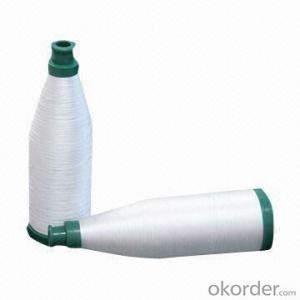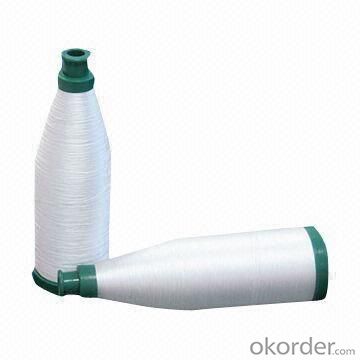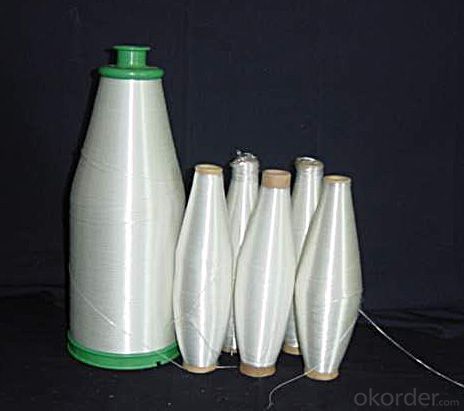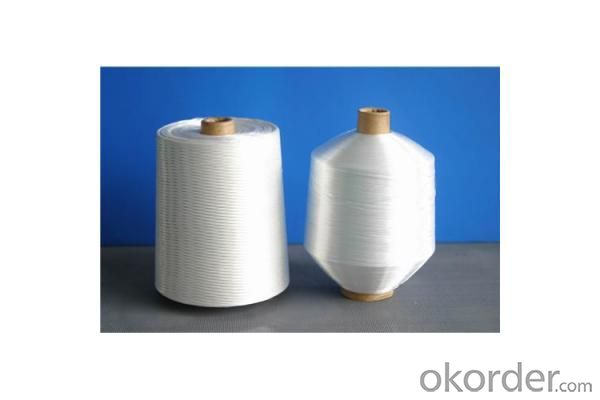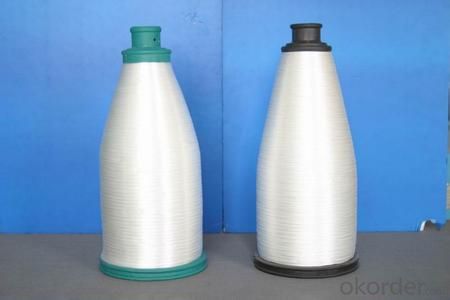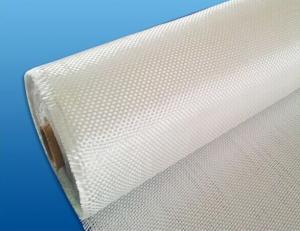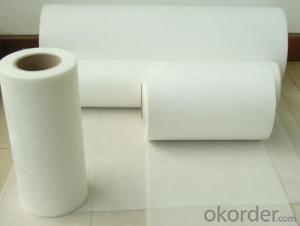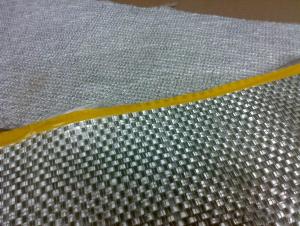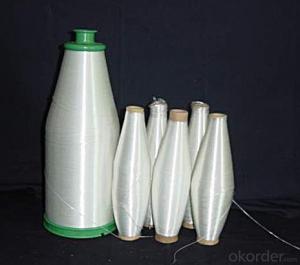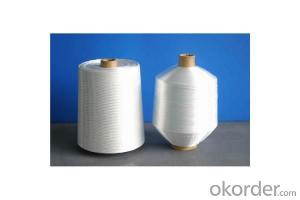Fiberglass Mat Tissue Yarns for All Kinds of Usages
- Loading Port:
- China Main Port
- Payment Terms:
- TT or LC
- Min Order Qty:
- 20000kg kg
- Supply Capability:
- 200000kg Per Month kg/month
OKorder Service Pledge
OKorder Financial Service
You Might Also Like
1.Brief Introduction
C-or E-textile glass a kind of additional twisting and plying yam. With the characteristics of high strength, corrosion resistance, heat resistance and high moisture absorption, no-alkali yam has high electric insulation, so it used to produce weaved wires and cables’ wrap cladding, protection sleeve, train of mine, insulation materials of electric machinery, every yam of woven cloth and other industrial yam. It can also supply big and little paper cube and other cube yams with different shapes and different roll weight.
2.Characteristics
Good Dispersibility.
Less fuzzy.
Density Even
3.Product Specifications
Product Code | Tex | diameter (um) | Sizing. | breaking strength | Twist |
CC7.5-22-1/2 110S | 44 | 7.5 | paraffin | ≥15.5 | 110±10 |
EC9-33-1/2 65S | 66 | 9 | ≥24.1 | 65±5 | |
EC8-25-1/2 65S | 50 | 8 | ≥19.2 | 65±5 | |
CC9-33-1/2 65S | 33 | 9 | ≥20.6 | 65±5 | |
CC11-44-6/0 | 264 | 11 | ≥81.6 | ||
CC11-44-1/3 110S | 132 | 11 | silane | ≥40.8 | 28±3 |
EC9-68-1/0 28Z | 68 | 9 | ≥18.0 | 28±3 |
Special specification can be produce according to customer requirements.
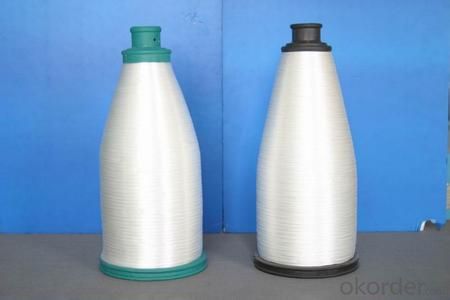
4.FAQ
a.Storage:
Unless otherwise specified,It should be stored in a dry, cool and rain-proof area. It is recommended that the room temperature and humidity should be always maintained at 15℃~35℃ and 35%~65% respectively.
- Q: Can fiberglass mat tissue be used for corrosion-resistant applications?
- Corrosion-resistant applications can indeed utilize fiberglass mat tissue. Comprised of delicate glass fibers fused with a resinous binder, this tissue offers exceptional properties for combating corrosion. Specifically designed to serve as a barrier layer, it finds utility in a range of applications that require resistance to corrosion, such as the construction of tanks, pipes, and vessels that face exposure to corrosive environments. By acting as a protective barrier, the fiberglass mat tissue effectively thwarts the infiltration of corrosive elements, thereby significantly enhancing the structure's longevity and durability. Furthermore, its lightweight nature and ease of handling, coupled with its ability to be easily molded into intricate shapes, render it an exemplary choice for corrosion-resistant applications.
- Q: Can fiberglass mat tissue be used for pipe insulation?
- No, fiberglass mat tissue is not typically used for pipe insulation. Fiberglass mat tissue is a thin material that is commonly used for reinforcing purposes in various industries. It is not designed to provide thermal insulation or to prevent heat loss in pipes. For pipe insulation, materials such as foam, mineral wool, or fiberglass pipe insulation are more commonly used. These materials are specifically designed to provide thermal insulation and protect pipes from heat loss, condensation, and freezing.
- Q: How does fiberglass mat tissue perform in high temperatures?
- Due to its inherent heat resistance properties, fiberglass mat tissue is highly effective in high temperatures. The mat is crafted from woven glass fibers, creating a durable and sturdy material. These glass fibers possess a high melting point, enabling the fiberglass mat tissue to endure elevated temperatures without distorting or compromising its structural integrity. Unlike other materials, fiberglass mat tissue does not shrink, warp, or become brittle when exposed to high temperatures. It maintains its dimensional stability and mechanical strength, making it suitable for a wide range of applications in industries such as automotive, aerospace, construction, and insulation. Furthermore, fiberglass mat tissue acts as a thermal insulator, providing protection against heat transfer. It effectively resists heat conduction and radiation, assisting in maintaining the desired temperature in a given environment or preventing heat damage to nearby components. Moreover, fiberglass mat tissue is non-combustible, meaning it does not burn or release toxic gases when subjected to fire. This characteristic makes it a dependable choice for applications that necessitate fire resistance, such as fireproofing insulation or protective barriers. In conclusion, fiberglass mat tissue excels in high temperatures. Its heat resistance, dimensional stability, mechanical strength, thermal insulation properties, and non-combustible nature establish it as an outstanding material for demanding environments where elevated temperatures are present.
- Q: Can fiberglass mat tissue be used for insulation in chemical storage tanks?
- Indeed, insulation in chemical storage tanks can be achieved using fiberglass mat tissue. The exceptional insulation properties of fiberglass render it a fitting substance for tanks that house chemicals. Typically composed of finely interwoven glass fibers, the fiberglass mat tissue constitutes a robust and long-lasting material. Its application to the inner walls of the tank effectively insulates and thwarts heat transfer. Furthermore, fiberglass exhibits corrosion resistance and can endure the detrimental effects of the chemicals commonly stored within these tanks, making it an optimal option for insulation in chemical storage tanks.
- Q: Is fiberglass mat tissue suitable for insulation in chemical processing plants?
- Indeed, fiberglass mat tissue proves to be a suitable option for insulation within chemical processing plants. Comprised of delicate glass fibers securely bonded with a binder, it possesses remarkable thermal insulation characteristics. Its capability to endure elevated temperatures and its resistance against numerous chemicals render it an ideal selection for deployment in chemical processing plants, where contact with corrosive substances or intense heat may occur. Moreover, fiberglass mat tissue is lightweight and effortlessly installed, presenting a cost-effective solution for insulation in such industrial settings.
- Q: Can fiberglass mat tissue be used for repairing fiberglass boats?
- Yes, fiberglass mat tissue can be used for repairing fiberglass boats. It is commonly used in boat repairs to reinforce weak or damaged areas and provide strength and durability to the repaired sections.
- Q: How does fiberglass mat tissue compare to polyurethane insulation?
- Fiberglass mat tissue and polyurethane insulation are two commonly used materials in the construction industry, but they have distinct differences in terms of composition, performance, and applications. Fiberglass mat tissue is made from glass fibers that are woven into a mat-like structure. It is primarily used as a reinforcement material in various applications such as roofing, wall insulation, and fiberglass composites. The main advantage of fiberglass mat tissue is its high tensile strength, which provides excellent structural support and durability. It is also resistant to fire and chemicals, making it a suitable choice for applications where safety is a concern. On the other hand, polyurethane insulation is a foam material that is known for its excellent thermal insulation properties. It is commonly used in buildings to reduce heat transfer and improve energy efficiency. Polyurethane insulation has a high R-value, which indicates its ability to resist heat flow. This makes it an ideal choice for insulation purposes, especially in areas with extreme temperature conditions. Additionally, polyurethane insulation is lightweight, easy to install, and has good moisture resistance. When comparing fiberglass mat tissue to polyurethane insulation, it is important to consider the specific needs and requirements of the project. Fiberglass mat tissue is more suitable for applications that require structural reinforcement, such as roofing and composite materials. It provides excellent strength and durability, making it a preferred choice for such applications. On the other hand, polyurethane insulation is more effective in terms of thermal insulation. It offers superior heat resistance and has a higher R-value compared to fiberglass mat tissue. Therefore, if the primary goal is to improve energy efficiency and reduce heat transfer, polyurethane insulation would be the better choice. Overall, fiberglass mat tissue and polyurethane insulation have their own strengths and weaknesses. The decision on which material to use should be based on the specific requirements of the project, such as structural support or thermal insulation needs. Consulting with a professional and considering factors such as budget, environmental impact, and local building codes can help in making an informed decision.
- Q: Can fiberglass mat tissue be used for roofing applications?
- Yes, fiberglass mat tissue can be used for roofing applications. Fiberglass mat tissue is a lightweight and flexible material that is commonly used in the construction industry for various purposes, including roofing. It is often used as a reinforcement layer in roofing systems to enhance their strength and durability. The fiberglass mat tissue is typically impregnated with bitumen or other waterproofing agents to create a water-resistant barrier on the roof. It also helps to improve the fire resistance and thermal insulation properties of the roof. Moreover, fiberglass mat tissue is resistant to mold, mildew, and other common roofing issues, making it an ideal choice for roofing applications.
- Q: Can fiberglass mat tissue be used for insulation?
- Yes, fiberglass mat tissue can be used for insulation. It is commonly used in the construction industry as a thermal and sound insulation material. The fiberglass mat tissue is made up of fine fibers of glass that are woven into a mat-like structure. This structure traps air and creates a barrier that helps to reduce heat transfer, keeping the desired area insulated and maintaining a comfortable temperature. Additionally, fiberglass mat tissue is also resistant to moisture, fire, and pests, making it a suitable choice for insulation in various applications.
- Q: Is fiberglass mat tissue suitable for railway rolling stock?
- Yes, fiberglass mat tissue is suitable for railway rolling stock. It offers excellent strength, durability, and fire resistance properties, making it a suitable material for various applications in the railway industry. Additionally, fiberglass mat tissue is lightweight, corrosion-resistant, and can be easily molded and shaped according to specific design requirements, making it an ideal choice for railway rolling stock components.
Send your message to us
Fiberglass Mat Tissue Yarns for All Kinds of Usages
- Loading Port:
- China Main Port
- Payment Terms:
- TT or LC
- Min Order Qty:
- 20000kg kg
- Supply Capability:
- 200000kg Per Month kg/month
OKorder Service Pledge
OKorder Financial Service
Similar products
Hot products
Hot Searches
Related keywords
